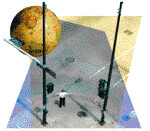Empire: Striding Across Africa
| I've been reading Empire: The Rise and Demise of the British World Order and the Lessons for Global Power by Niall Ferguson wherein he explains how "an archipelago of rainy islands... came to rule the world." Richly illustrated with maps charts and drawings, this book relates the events that led to British domination in India and Africa, and a presence on every continent. It was not hyperbole to say that the sun never set on the British Empire. Some critics have called Ferguson's work "revisionist", as he often defends the actions of the Empire as an overall good thing for its subjects (contrary to other recent scholarship). His final chapter is directed at the United States. What lessons can be learned from British successes and errors by the inheritors of the new "world empire" as that power is challenged? |

Lord Salisbury, the Foreign Secretary and later Prime Minister, was opposed to this vision: "I can imagine no more uncomfortable position than the possession of a narrow strip of territory in the very heart of Africa, three month's distance from the coast, which should be separating the forces of a powerful empire like Germany and... another European Power." He did not believe that territory should be acquired, simply because it looks good on a map. Speaking of Rhodes, he said, "I think that the constant study of maps is apt to disturb men’s reasoning powers"
This quote has of course become the motto for Cartophilia.
Rhodes' vision of connecting African holdings, North and South, came to fruition after the First World War and the acquisition (by League of Nations "mandate") of Tanganyika (later Tanzania).

Thanks to Pascal for tipping me off to this one.
Labels: africa, books, united kingdom





0 Comments:
Post a Comment
Subscribe to Post Comments [Atom]
<< Home